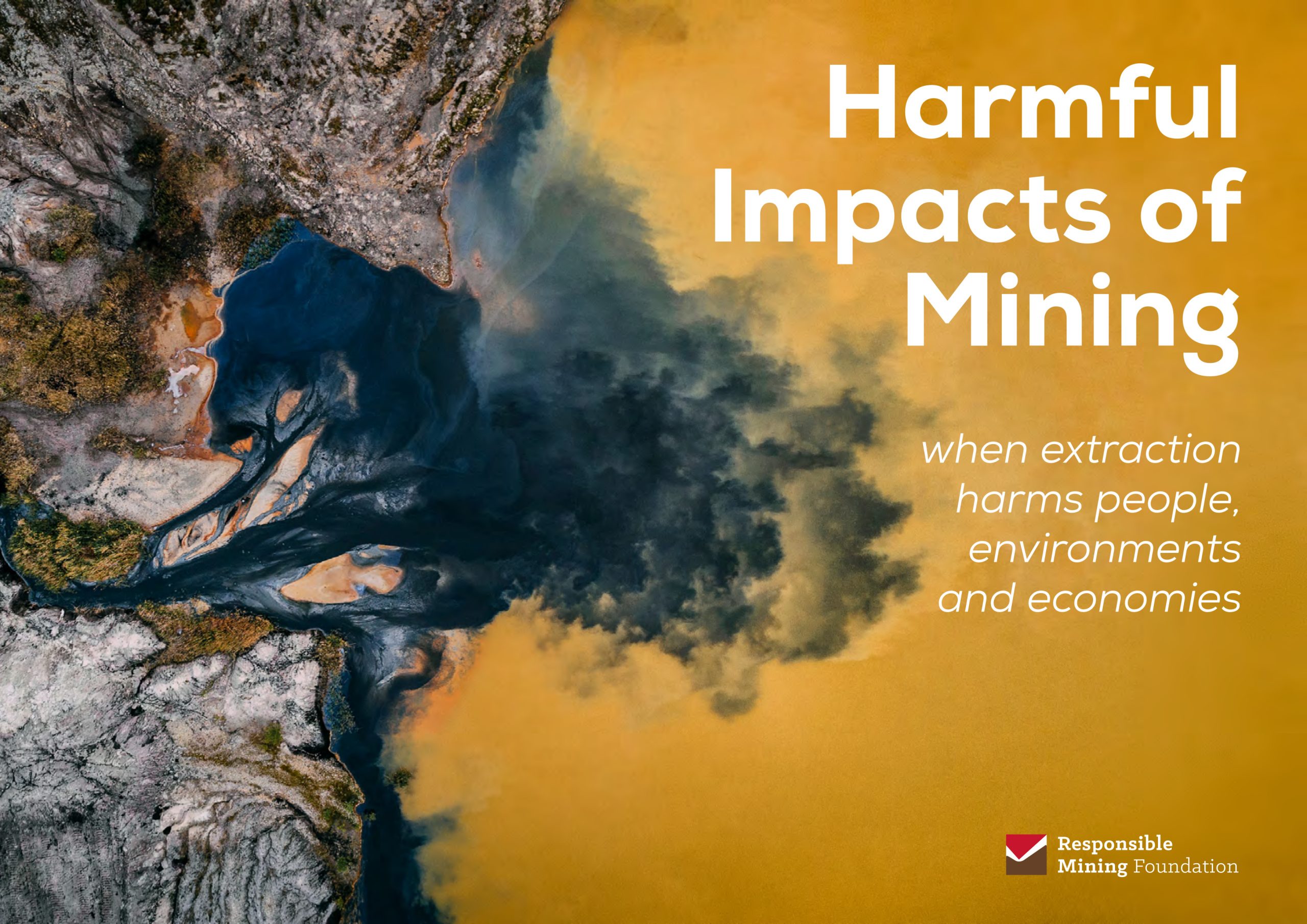Kitzbühel's Financial Catastrophe: The Impacts and Lessons for Responsible Tourism.
Editor's Notes: "Kitzbühel's Financial Catastrophe: Impacts And Lessons For Responsible Tourism" have published today date". The importance of responsible tourism is becoming increasingly recognized, as the negative impacts of mass tourism become more apparent. One of the most high-profile examples of the financial consequences of irresponsible tourism is the case of Kitzbühel, Austria.

Harmful Impacts of Mining - Responsible Mining Foundation - RMF - Source www.responsibleminingfoundation.org
In the 1960s and 1970s, Kitzbühel was one of the most popular ski resorts in the world. However, in the 1980s, the resort began to experience a decline in tourism. This was due to a number of factors, including the rise of cheaper ski destinations in Eastern Europe and the increasing popularity of all-inclusive holidays. As a result, Kitzbühel's economy suffered, and the town was forced to declare bankruptcy in 1994.
The bankruptcy of Kitzbühel was a wake-up call for the tourism industry. It showed that even the most popular destinations can be vulnerable to the negative impacts of irresponsible tourism. In the years since the bankruptcy, Kitzbühel has worked to develop a more sustainable tourism model. The town has invested in new infrastructure, such as a new ski lift system and a new convention center. It has also worked to promote responsible tourism practices, such as encouraging visitors to use public transportation and to stay in locally-owned hotels.
The efforts of Kitzbühel have been successful. The town has once again become a popular tourist destination, and its economy has rebounded. The lessons that Kitzbühel learned from its financial catastrophe are now being applied by other destinations around the world. Responsible tourism is becoming increasingly important, as tourists become more aware of the negative impacts of their travel choices.
FAQ
This section aims to address frequently asked questions, concerns, and misconceptions surrounding the financial crisis that struck Kitzbühel, a popular tourist destination in Austria. By providing clear and informative responses, we hope to shed light on the key impacts and lessons that can be drawn for responsible tourism practices.

Sustainability | Free Full-Text | Memorable Tourist Experiences in - Source www.mdpi.com
Question 1: What were the primary causes of Kitzbühel's financial catastrophe?
The financial crisis in Kitzbühel was primarily attributed to an overreliance on winter tourism, specifically alpine skiing. The resort's economy was heavily dependent on seasonal revenues, making it vulnerable to fluctuations in weather conditions and changing tourism trends.
Question 2: How did the financial crisis impact the local community?
The financial crisis had a significant impact on the local community of Kitzbühel. Many businesses, particularly those reliant on tourism, faced closures or reduced revenues. Unemployment rates rose, and the overall economic stability of the region was severely affected.
Question 3: What lessons can be learned from Kitzbühel's experience for responsible tourism?
Kitzbühel's financial crisis underscores the importance of diversifying tourism economies to reduce reliance on a single sector. It also highlights the need for sustainable tourism practices that preserve the environment and cultural heritage of a destination while promoting economic growth.
Question 4: How can destinations avoid similar financial crises in the future?
To avoid similar financial crises in the future, destinations should adopt a balanced approach to tourism development. This includes diversifying tourism products and services, investing in sustainable infrastructure, and promoting responsible travel practices among visitors.
Question 5: What role can governments and tourism organizations play in promoting responsible tourism?
Governments and tourism organizations have a crucial role in promoting responsible tourism. They can implement policies that encourage sustainable practices, support local businesses, and educate visitors on the importance of respecting the environment and local cultures.
Question 6: How can tourists contribute to responsible tourism practices?
Tourists can contribute to responsible tourism practices by choosing sustainable travel options, respecting local customs and traditions, and supporting businesses that prioritize environmental protection and social responsibility.
By understanding the key impacts and lessons learned from Kitzbühel's financial catastrophe, destinations around the world can proactively adopt responsible tourism practices that promote economic growth while preserving their natural and cultural heritage.
Kitzbühel's Financial Catastrophe: Impacts And Lessons For Responsible Tourism provides a more in-depth analysis of this case study and offers further recommendations for sustainable tourism development.
Tips
The Kitzbühel case study offers valuable lessons for destinations seeking to balance tourism development with environmental and social sustainability. Here are some tips to help avoid similar pitfalls:
Tip 1: Conduct thorough environmental impact assessments. Assess the potential impacts of tourism development on natural resources, wildlife, and local ecosystems. Mitigate identified risks through appropriate planning and management measures.
Tip 2: Engage local communities in decision-making. Involve residents in shaping tourism policies and projects that affect their lives and livelihoods. Foster a sense of ownership and responsibility among local stakeholders.
Tip 3: Diversify the tourism economy. Avoid over-reliance on a single type of tourism or a small number of major events. Explore alternative revenue streams and promote year-round tourism to spread benefits more evenly.
Tip 4: Limit excessive infrastructure development. Carefully consider the need for new infrastructure such as hotels, ski lifts, and golf courses. Prioritize sustainable and environmentally friendly construction practices.
Tip 5: Implement effective waste management systems. Establish comprehensive waste collection, recycling, and disposal systems to minimize environmental pollution. Promote responsible waste disposal among tourists and businesses.
Tip 6: Monitor and adapt tourism policies. Regularly evaluate the effectiveness of tourism management strategies and make adjustments as needed. Use data and feedback from stakeholders to inform decision-making.
Tip 7: Invest in public transportation and pedestrian-friendly infrastructure. Reduce reliance on private vehicles by providing efficient and convenient public transportation options and creating walkable and bikeable areas.
Tip 8: Promote sustainable tourism practices. Encourage tourists to make responsible choices such as respecting local customs, conserving water and energy, and supporting local businesses that prioritize sustainability.
By implementing these tips, destinations can strive for a more balanced and sustainable approach to tourism that benefits both the local community and the environment.
Kitzbühel's Financial Catastrophe: Impacts And Lessons For Responsible Tourism
Kitzbühel's financial catastrophe offers valuable lessons for responsible tourism. Its impacts and implications are multifaceted, encompassing economic, environmental, and socio-cultural dimensions. This analysis explores six key aspects to understand the crisis and its implications:
- Over-reliance on mass tourism: Kitzbühel's dependence on winter sports led to unsustainable crowds and environmental damage.
- Lack of diversification: Failure to diversify revenue streams beyond tourism made Kitzbühel vulnerable to economic fluctuations.
- Environmental degradation: Mass tourism contributed to air and water pollution, soil erosion, and habitat loss.
- Social impacts: Tourism-driven gentrification led to displacement of locals and a loss of community identity.
- Inadequate infrastructure: Insufficient infrastructure, especially during peak season, exacerbated environmental strains and public safety concerns.
- Need for responsible practices: Kitzbühel's experience highlights the necessity of implementing responsible tourism practices to mitigate negative impacts.
These aspects underscore the interconnectedness between tourism development and its broader consequences. By embracing sustainable practices, diversifying economies, and fostering community engagement, destinations can avoid the pitfalls that led to Kitzbühel's financial crisis and ensure a more harmonious and resilient tourism industry.
Watching Movies: Zachary Quinto Predicts The Financial Crisis Wearing A - Source www.wristwatchnews.co.uk
Kitzbühel's Financial Catastrophe: Impacts And Lessons For Responsible Tourism
The financial crisis that struck the Austrian ski resort town of Kitzbühel in 2008 serves as a cautionary tale about the risks of over-reliance on tourism. The town's economy was heavily dependent on winter sports, and when snow conditions were poor in the 2007-08 season, the town's businesses suffered. The economic downturn led to a decline in property values, high unemployment, and a loss of confidence in the local economy.

What are the benefits of responsible tourism? - Amenitiz Blog - Source amenitiz.com
The Kitzbühel crisis highlights the importance of responsible tourism. When tourism is the dominant industry in a town, it is essential to diversify the economy and reduce the reliance on a single sector. This can be done by developing other industries, such as manufacturing, agriculture, or technology. It is also important to promote sustainable tourism practices, such as reducing energy consumption and waste, and respecting the local culture and environment.
The lessons learned from Kitzbühel can be applied to other tourist destinations around the world. By diversifying the economy, promoting sustainable tourism practices, and investing in infrastructure and education, towns can reduce their vulnerability to economic downturns.
Conclusion
The Kitzbühel financial crisis was a wake-up call for the tourism industry. It showed that over-reliance on tourism can lead to economic instability. To avoid a similar fate, tourist destinations need to diversify their economies and promote sustainable tourism practices. By doing so, they can create a more resilient economy that is less vulnerable to economic downturns.
The lessons learned from Kitzbühel are not just for tourist destinations. They are also relevant for any community that is heavily reliant on a single industry. By diversifying the economy and investing in sustainable practices, communities can create a more resilient economy that is better prepared for the future.
EmoticonEmoticon